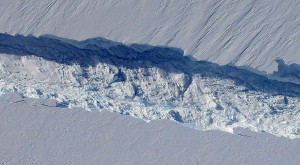Giant Antarctic glacier beyond point of no return
PARIS – Antarctica’s Pine Island Glacier, one of the biggest single contributors to world sea-level rise, is melting irreversibly and could add as much as a centimeter (0.4 inches) to ocean levels in 20 years, a study said Sunday.
The glacier “has started a phase of self-sustained retreat and will irreversibly continue its decline,” said Gael Durand, a glaciologist with France’s Grenoble Alps University.
Durand and an international team used three different models to forecast the glacier’s future based on the “grounding line,” which is the area under water where the ice shelf – a sea-floating extension of the continent-covering ice sheet — meets land.
This line has receded by about 10 kilometers (six miles) in the past decade.
The grounding line “is probably engaged in an unstable 40-km (25-mile) retreat,” said the study, published in the journal Nature Climate Change.
A massive river of ice, the glacier by itself is responsible for 20 percent of total ice loss from the West Antarctic Ice Sheet today.
On average, it shed 20 billion tons of ice annually from 1992-2011, a loss that is likely to increase up to and above 100 billion tonnes each year, said the study.
This is equivalent to 3.5-10 millimeters (0.14-0.4 inches) of global average sea-level rise over the next 20 years.
The global mean sea level rose by 3.2 mm in 2010 – itself a near-doubling from the rate of two decades earlier.
The European Space Agency said last month that the West Antarctic ice sheet was shedding ice at a much faster rate than before – currently at about 150 cubic kilometers (36 cubic miles) per year.
Climate scientists are keeping a worried eye on the mighty ice sheets of Greenland and Antarctica, as continued losses could threaten vulnerable coastal cities with dangerously high sea levels.
Last year, the United Nations’ climate science body, the Intergovernmental Panel on Climate Change (IPCC) projected sea levels would rise between 26 and 82 centimeters (10.4 and 32.8 inches) by 2100.
